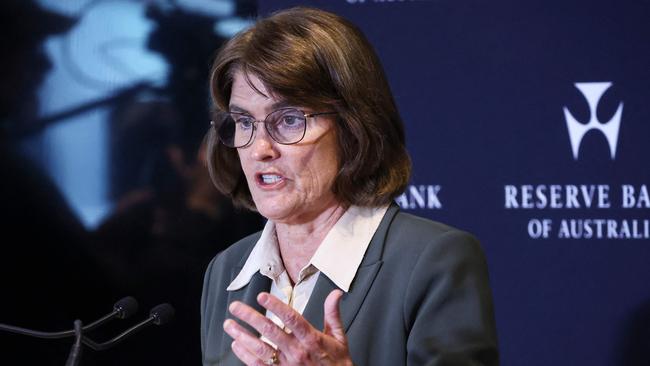‘Don’t use interest rates cut as cover to buy votes’, say economists
The Reserve Bank’s quarter-point interest rate cut must not be a green light for a pre-election cash splash, economists have warned.

The Reserve Bank’s quarter-point interest rate cut must not be a green light for a pre-election cash splash, economists have warned, calling on the nation’s politicians to focus on reining in booming government spending rather than buying votes.
Amid growing expectations Anthony Albanese will cancel the March budget and call an April election, Labor MPs are pushing for big-spending promises, including on infrastructure and cost-of-living support.
But economist Chris Richardson said while there was an economic case for a cut, the RBA decision had removed the last “guardrail” against Canberra unveiling potentially inflationary spending promises. “The RBA has just benched itself as a constraint on what politicians on both sides do and don’t do before the election. It was the last institutional restraint on the dumbness of our politicians,” he said.
The concern over a further step-up in government spending was shared by EY chief economist Cherelle Murphy who warned that the economy, already near full capacity, did not require additional fiscal stimulus.
“That’s not to say there’s no room for helping those who need help, but in aggregate, we definitely don’t need additional spending,” she said. “If anything, we’d actually need for them to start to pull things in.”
She pointed to Treasury forecasts which show the budget was is not expected to return to surplus for a decade.
The comments came after the RBA on Tuesday sharply revised higher its forecasts for public demand – a proxy for federal and state government spending – following a string of spending commitments and upgrades to expenditure projections in mid-year budget updates last year.
One measure many Labor MPs are pushing for is an extension of the $300 electricity rebate for households and businesses which is due to expire in July.
Jim Chalmers on Wednesday would not confirm whether prolonging the measure was a certainty, but flagged an extension of the power bill rebate – along with a host of other cost-of-living giveaways – was “under review”.
While Peter Dutton has rejected overtures to extend the popular measure, which cost $3.5bn in last year’s federal budget, the Coalition has provided scant detail on how it would curtail growth in government expenditure.
It has similarly produced few savings measures to offset the multi-billion-dollar price of its proposed taxpayer-funded tilt towards nuclear energy.
Anthony Albanese on Wednesday denied he was disappointed that RBA governor Michele Bullock poured cold water of further rate cuts in the short term, arguing her conservative outlook was unsurprising.
“The RBA governor has done her job, and the RBA governor has made some comments that aren’t surprising,” the Prime Minister said. “Our job has been to get inflation down. That’s been our objective, helping Australians, working with Australians to get inflation down, to get wages up, so that we improve costs of living.”
The Opposition Leader said he was relieved the cash rate had come down but Australian families were continuing to struggle.
“Inflation is a big problem still in the economy, largely because of the government’s renewables-only energy policy,” Mr Dutton said. “I want to make sure that we can support families by good economic management. The government hasn’t made the economic decisions that were necessary to keep inflation low. That’s the reason we’ve had 12 interest rate increases under Mr Albanese.”
Labor MPs who were calling for 50-basis-point rate cuts – including Mike Freelander and Graham Perrett – backed Tuesday’s cut as a good start.
Labor MPs believe there is little to no chance of the March 25 budget being delivered, with an election favoured for April 5 or 12.
Independent economist Saul Eslake agreed Mr Albanese and Mr Dutton should avoid big-spending promises during the election campaign, given the future trajectory of rate cuts hangs in the balance. But he said it was government spending that had kept the nation out of recession.
“It is right to say if governments hadn’t spent as much, inflation may have come down a little bit more quickly,” Mr Eslake said. “But it is also true that if governments hadn’t of spent so much we probably would have had one or two quarters of negative growth.”
Also contained within the RBA’s fresh forecasts was a substantial downgrade to labour productivity projections – which is expected to slump 0.7 per cent this financial year – prompting HSBC chief economist Paul Bloxham to say the spotlight needed to be put on politicians.
“We spend way too much time talking about the RBA in the national economic discussion but they’ve got one policy instrument to make it happen and that’s the cash rate – all of the other policy instruments belong to all of the other policymakers,” he said.
Government spending has already raised concerns for ratings agency S&P, which on Wednesday imposed a credit downgrade on Queensland after the dour position of the state’s finances was revealed in an economic update last month.
While bumper commodity price windfalls had previously supported Queensland’s budget, S&P analyst Anthony Walker said strong spending growth was placing strain on the state’s finances.



To join the conversation, please log in. Don't have an account? Register
Join the conversation, you are commenting as Logout